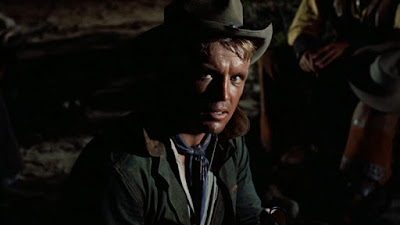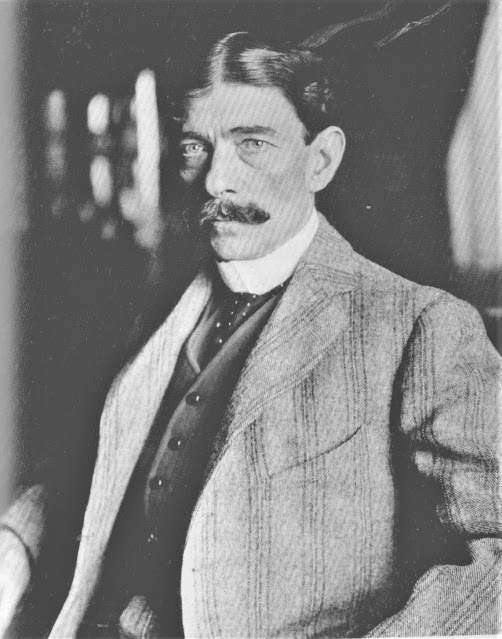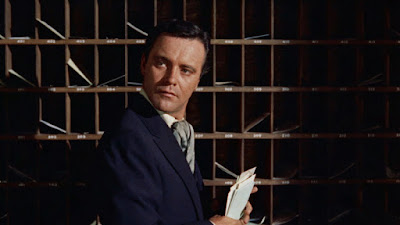 | |
|
THE UNREAL WEST.
Somewhere between the bleak, existential dramas of the Ranown cycle and the down-and-dirty school typified by the Coens’ True Grit remake and Tarantino’s Django Unchained, a sub-genre, the action comedy western, got lost.
You know what I mean, I’m sure. The phrase “rip roaring” generally appeared in the advertising. They had one of those hoe-down scores that recycled Aaron Copland’s Billy the Kid. And they gave employment to a whole generation of frontier character actors; without them, Strother Martin, Jack Elam, Richard Jaeckel and Henry Jones would have been on welfare. By the early sixties, most had been spun off into such TV series as Maverick and Sugarfoot but periodically a film like The War Wagon or Support Your Local Sheriff would appear to remind us of their half-forgotten pleasures.
 |
| Richard Jaeckel, Cowboy |
Among these films, Cowboy stands out. Made in 1958, it slightly preceded the vogue, and also had the benefit of Delmer Daves as director and a blacklisted Dalton Trumbo as uncredited writer next to Edward H. North. (Trumbo’s credit has been belatedly restored.)
 |
| Frank Harris "...bat ears, dark hair with a crinkle in it that grew low on the forehead, and a truculent moustache." |
The source is an improbable one - On the Trail: My Reminiscences as a Cowboy, written by one of the least likely of all western characters, Frank Harris. Friend and biographer of Oscar Wilde, author of a memoir in which he claims to have slept with two thousand women, inventor of an erotic card game called Dirty Banshee, Harris also had an awesome ability to offend.
John dos Passos called him “an objectionable little man. He was sallow as a gypsy. He had bat ears, dark hair with a crinkle in it that grew low on the forehead, and a truculent mustache. People remarked on the richness of his bass voice. His charm was great, particularly for the opposite sex. He had the gift of the gab to a sublime degree and a streak of deep scoundrelism that was the ruin of him.” Whoever decided on Jack Lemmon to impersonate Harris deserves some kind of award.
 |
| Jack Lemmon, Cowboy |
Harris did visit the United States and become a citizen. He did not witness the 1908 San Francisco earthquake nor meet Wild Bill Hickok, nor participate in the cattle drives from Mexico to Chicago depicted in the film. Harris’ secretary Thomas Bell did, however, and never ceased to complain of having his experiences ripped off.
The film discovers Harris as a desk clerk in an up-market Chicago hotel which is thrown into confusion by the imminent arrival of rancher Tom Reece (Glenn Ford) and his hands, who have just driven a herd from Mexico. Harris succeeds in buying his way into a job with Reece, and the story segues into a bildungsroman,with the tenderfoot taught the ways of the world and the west by the reluctant cattleman.
John Huston originally owned the book, and wanted to cast his father Walter as Reece, obviously seen at that time as a patriarch, and Montgomery Cliff as Harris. After the death of Huston Senior, Spencer Tracy was considered, then Gary Cooper, with Alan Ladd. Who had the idea to move Reece down a generation in age and make it a back-handed buddy film for a younger audience? Daves, probably; after all, his next films, his most successful, was the teen melodrama A Summer Place, starring Troy Donohue.
But it works. Cowboy is colourful, witty, occasionally romantic, but above all young. Lemmon and Ford are clearly having fun, even though their screen relationship is adversarial almost to the end. As Harris’s experiences on the trail inure him to violence, Reece wisely observes that ruthlessness must be leavened with compassion. “You haven’t got tough,” he says of his superficially hard-boiled apprentice, “You’ve just got miserable.”
The hand of Trumbo is evident passim. After Lemmon has accused Reece of trying to go back on their deal, the Mexican trail boss (Victor Manuel Mendoza) tells Reece “He’s right.”
“What do you know about it?” Reece snarls.
“Because if he was not right, you would have killed him by now.”
Cowboy relishes demolishing the illusions of frontier life. Take the horse. “A horse has a brain the size of a walnut,” says Reece. “They’re mean, they’re treacherous and they’re stupid. There never was one that had the sense to move away from a hot fire. And have you ever eaten horse? It hasn’t got a gamy flavour. It hasn’t got a beef flavour. It just tastes like…horse.” As for the Noble Red Man, the trail hands spend some time discussing which part of an Indian is tenderest to eat. John Ford this is not.
But I never fail to enjoy its ease. Life on the trail was surely as hard as the histories say. But Lemmon and Ford and Daves and mostly, I suspect, Trumbo give it a swagger and a style that leave you wanting more.
*****************************************************************
Editor's note: For those seeking consideration of what John Baxter calls "the bleak, existential dramas of the Ranown cycle", click on the film titles to read Tom Ryan's recently posted thoughts so far on three films in the cycle Seven Men From Now, The Tall T and Decision At Sundown
No comments:
Post a Comment
Note: only a member of this blog may post a comment.